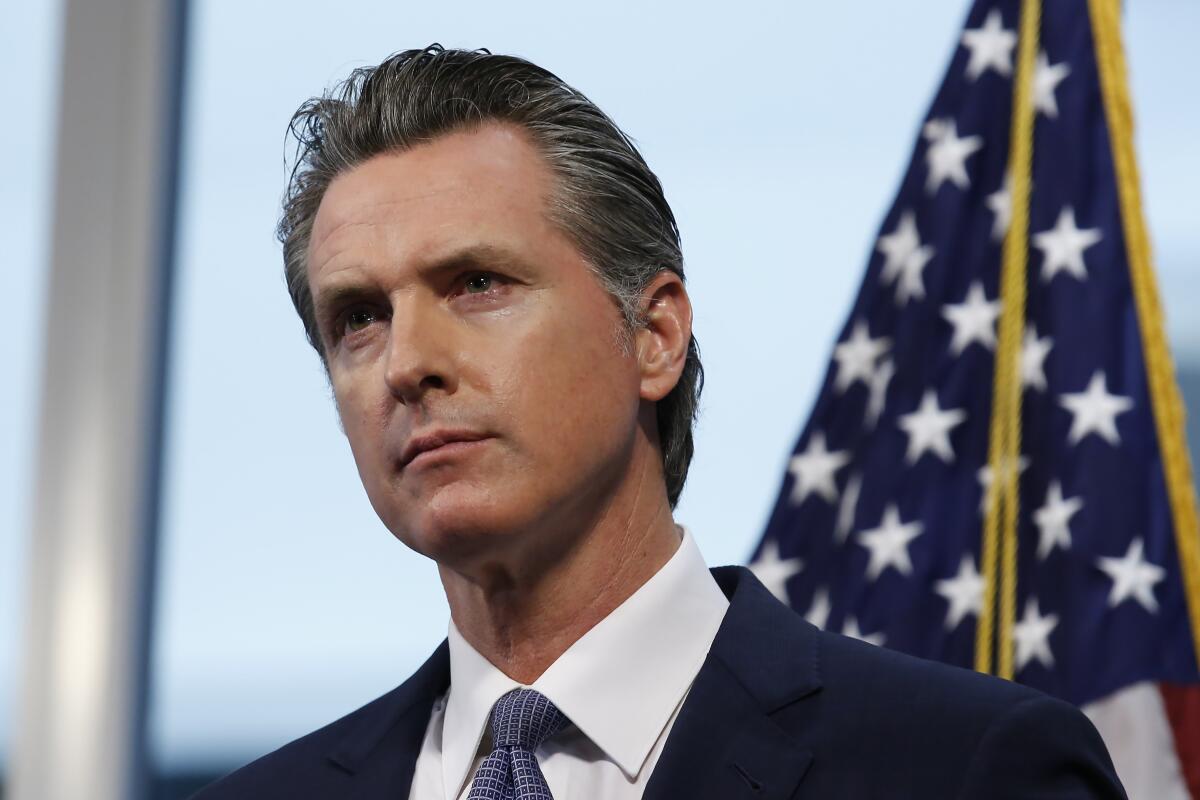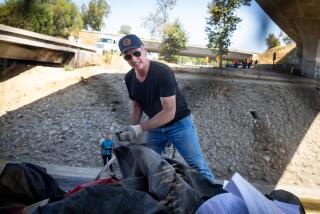Column: Newsom is helping immigrants amid coronavirus pandemic. There’s nothing Trump can do about it

SACRAMENTO — Three years ago, President Trump complained to Fox News that California was “out of control.” What he meant was that the state was out of his control. It still is.
And states always will be, no matter who is occupying the Oval Office.
Trump must have been asleep in his high school civics class when the teacher lectured about states’ rights and the 10th Amendment of the U.S. Constitution.
Trump has been knocked down by federal courts a few times when he tried to force his will on California.
The “out of control” gripe was a reference to legislation pending in Sacramento to declare California a “sanctuary state” for immigrants living here illegally. The president threatened to withhold federal funds if the Legislature and Gov. Jerry Brown enacted the bill. They did. But Trump wasn’t allowed to block funds already appropriated by Congress.
Last Monday, Trump declared he had “total” authority to reopen states that governors had shut down to slow the spread of the coronavirus, even if they objected. Governors ignored him and proceeded with their own planning. Trump soon backed off and told the governors he was authorizing them to call their “own shots” — so-called authorization they didn’t need.
One of my favorite California rebuffs of Trump came last week when Gov. Gavin Newsom authorized payments of $500 each to undocumented workers — up to $1,000 per household — as partial reconciliation for their snub by the president and Republican U.S. Senate.
Trump and Republican senators insisted that immigrants without legal status be denied the $1,200-per-person virus payouts authorized in the $2.2-trillion federal stimulus package. Undocumented workers also aren’t eligible for unemployment benefits.
So Newsom established a relief fund for immigrants lacking legal status. By government standards, it wasn’t much. But the one-time payments will help temporarily.
The governor set aside $75 million for 150,000 workers hurt by the virus shutdown. The money will be distributed by local nonprofit groups that help immigrants. In addition, he arranged for charities to raise another $50 million for roughly 100,000 more undocumented people.
“We feel a deep sense of gratitude for people who are in fear of deportations but are still addressing essential needs of tens of millions of Californians,” Newsom told reporters.
“In the healthcare sector, in the agriculture and food sector, in the manufacturing and logistics sector and the construction sector…
“This is a state that steps up always to support those in need, regardless of status.”
One striking thing was that a generation ago, any governor who publicly praised undocumented immigrants and gave them tax money would have generated a huge political backlash. Even a decade ago it would have fueled some fire.
Most voters thought that people who broke immigration laws and entered the country illegally didn’t deserve taxpayer-funded benefits — even though they paid taxes themselves — and should be deported. Providing benefits merely invited more illegal immigration.
In 1994, Californians voted overwhelmingly for Proposition 187 to deny schooling, non-emergency healthcare and other public services to immigrants living here illegally. A federal judge ruled it unconstitutional.
Today, immigrants without legal status are generally accepted by the citizenry.
“They’re part of the fabric of what we are in the state,” says Kim Johnson, director of the state Department of Social Services. “We recognize their contributions to our society and that they, too, are burdened by our emergency health crisis.”
One thing that happened was this: There are now slightly more Latinos than white people living in California. And family members of many Latino citizens have a direct connection to illegal immigration.
I called Mark Baldassare, president and pollster of the nonpartisan Public Policy Institute of California. What changed voters’ minds over the years?
“Experience,” Baldassare replied. “Voters set aside the rhetoric and realized immigrants’ importance for the California economy and our life. Personal experience every day. Knowing them. Neighbors. Parents in school. Working. Consumers. They’re a reality, not a concept.
“The whole notion of ‘build the wall’ was never popular in California.”
Baldassare recalls there wasn’t much pushback last year when the Legislature and governor made undocumented adult immigrants under age 26 eligible for Medi-Cal, the state’s healthcare program for the poor. Children up to age 18 already were eligible.
This year, Newsom has proposed providing Medi-Cal for seniors 65 and older.
A PPIC poll in January found that 82% of California voters — including 96% of Democrats and 60% of Republicans — believe undocumented immigrants should be allowed to stay here legally.
In a PPIC poll last September, likely voters were asked whether they considered immigrants to be a benefit to California or a burden. Interviewers didn’t specify whether the immigrants were undocumented or here legally. The answers: 66% a benefit, 28% a burden. But 58% of Republicans considered them a burden.
PPIC reports there are 2.3 million undocumented immigrants in California, about 1.7 million of them in the labor force. That’s about 9% of the total workforce.
Newsom said they pay $2.5 billion in state and local taxes. But no one had any details, and that seems a bit high considering their low wages.
Regardless, the governor deserves credit for helping them with rent money.
“It’s the right moral and ethical — and I would argue economic — thing to do,” the governor said.
Fortunately, the nation’s founders granted substantial power to the states. And Newsom and other governors are exercising it with or without presidential “authorization.”
More to Read
Sign up for Essential California
The most important California stories and recommendations in your inbox every morning.
You may occasionally receive promotional content from the Los Angeles Times.











